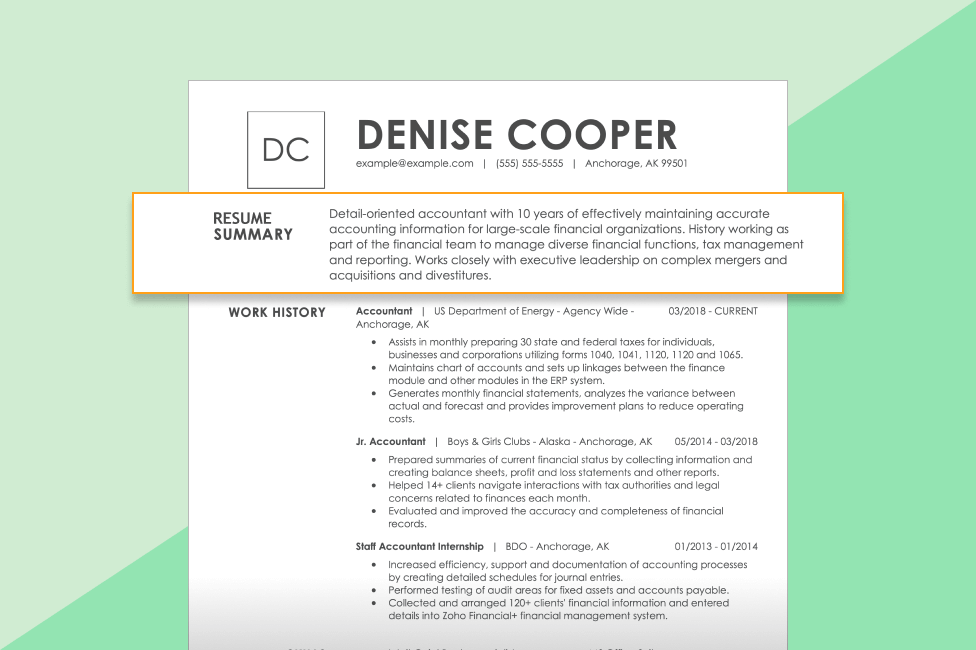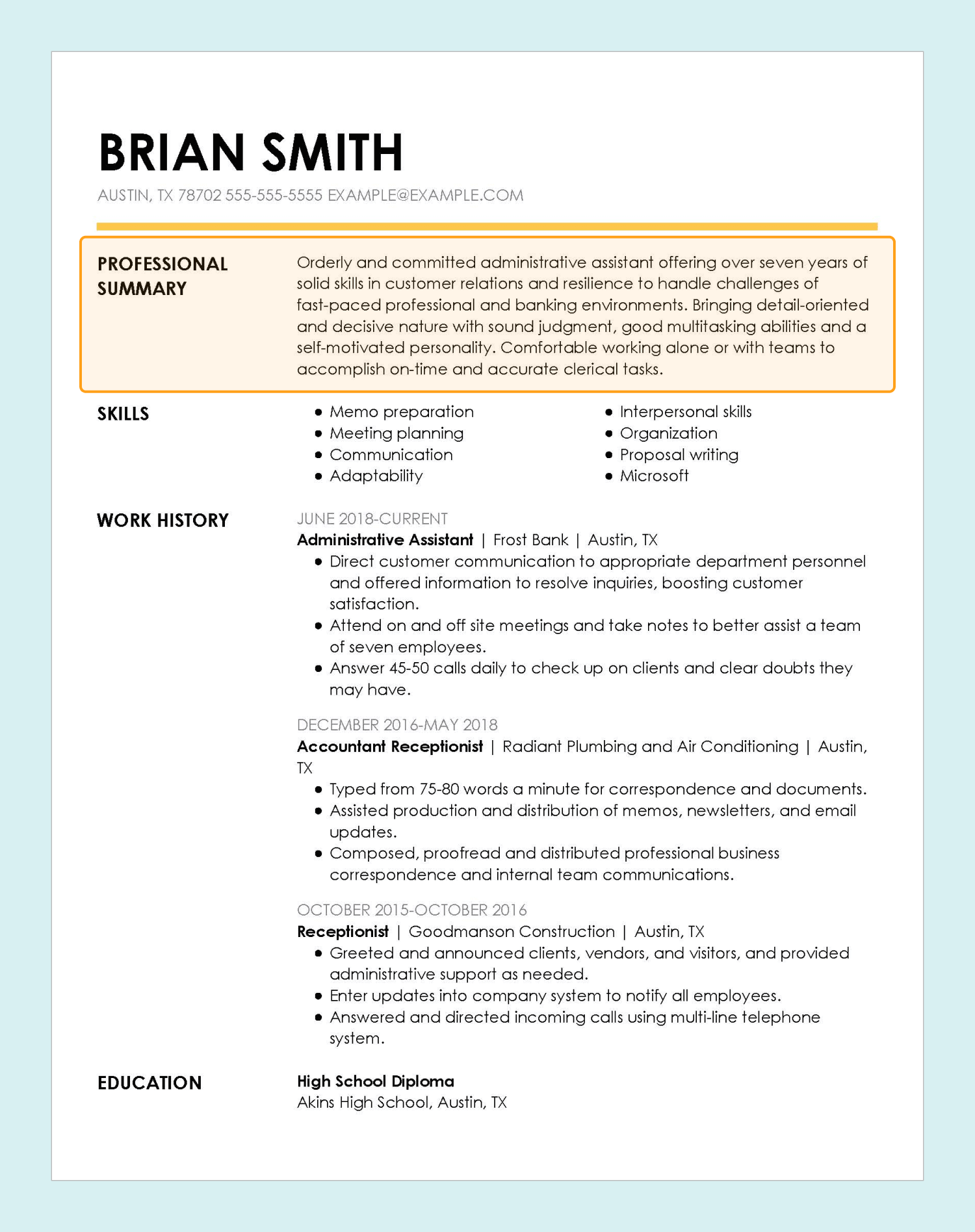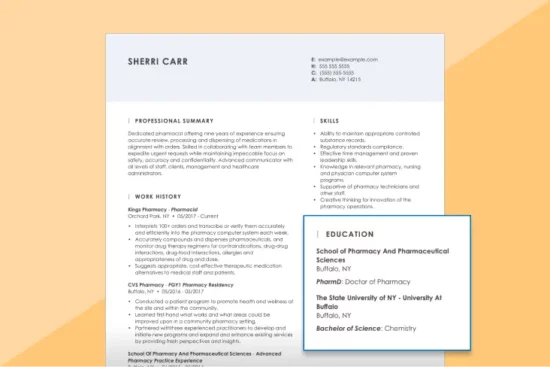Resume Summary Guide: 40 Examples and Step-by-Step Instructions
A resume summary is your first chance to show recruiters why you’re the ideal candidate. We walk you through how to write a good resume summary and provide 40 resume summary examples to get you started.
Hired By:*


Picture this: the hiring manager from a reputable company is skimming through the dozens of applications their job posting received. They land on your resume and start scanning it to see if you meet the general requirements.
Before they even reach your work history section, they see that you possess an in-demand certification or maybe that you achieved record sales in Q2. The recruiter now decides to take their time to carefully review your resume.
That’s the power of a well-written and strategic resume summary. Let’s learn how to write one.
What Is a Resume Summary and Why Is it Important?
A good resume summary consists of two to four sentences emphasizing your unique value to an organization. Think of it as a sales pitch that lists your top qualifications.
The summary section of your resume is the first part of your document a recruiter will read, so it’s critical to make a strong first impression.
The resume summary demonstrates who you are as a working professional and piques the hiring manager’s interest, prompting them to delve further into your resume.
When should you include a resume summary?
For seasoned professionals with years of experience, include a professional summary on your resume to highlight prior work experience and its relevance to the targeted position.
However, if you have less than two years of experience or are applying for a job in a new industry, you should opt for a resume objective instead.
Resume objectives or “objective statements” are slightly different from resume summaries. They focus more on what you want to achieve rather than what you’ve done and have to offer an employer.
Whichever approach you choose, remember that the summary and objective are ever-changing sections, and you should tailor them when updating your resume for each job application.
PRO TIP
If you’re ready to jump into the writing process now or want an extra edge in creating an excellent professional resume summary, try our Resume Builder.
Resume Summary Examples by Career Type
Browse the best summaries for resumes for top industries that you can copy and paste onto your resume. Remember to highlight your unique achievements, and you should be good to go!
Accounting resume summary examples
- “Efficiency-driven CPA with 4+ years of experience developing and executing financial systems. Ethical professional with expertise in local tax codes. Ethical professional with expertise in local tax codes. My strong data analysis and problem-solving skills help me reduce business costs.”
- “Accurate accountant brings 11 years of experience from the health care industry. Adept at bookkeeping, inventory assessment, and cutting operational costs. Clear communication and honesty are the bedrock of my career success.”
- “Reliable CPA with eagerness to learn, discipline, and a great educational background. My attention to detail, foresight, and financial analysis skills are valuable assets for the business.”
Administration resume summary examples
- “High-achieving executive assistant with 5+ years of experience supporting CEO and other executives. Provided everything from customer support to data entry and prepared well-researched documents. Great time management skills, proficient in MS Office and Google Workspace.”
- “Versatile administrative manager brings 8+ years of experience overseeing smaller and larger (10+ people) administrative teams. Adept at facilitating meetings, conference calls, workflow management, and spreadsheet creation. My track record of efficient office operation is thanks to my effective organizational and problem-solving skills.”
- “Eager-to-please office assistant brings two years of experience and a positive attitude. My exceptional organization, planning, and calendar management skills have earned me much verbal praise and recognition from employers.”
Customer service resume summary examples
- “Dedicated and friendly customer service specialist with three years of experience in verbal troubleshooting, tech support, and customer care. Received an average 91% customer satisfaction rating last year, 13% higher than the company average.”
- “Focused customer service agent has 7+ years of know-how dealing with customer complaints and turning them into positive experiences. My friendly demeanor and active listening help identify problems, and my analytical nature guides me to practical solutions.”
- “Committed customer service agent with experience helping various customers for over two years. As a detail-oriented professional who works well under pressure, I meet deadlines and quotas and increase customer satisfaction.”
Design resume summary examples
- “Creative and detail-oriented graphic designer brings four years of experience and skills in various mediums, such as digital, print, and video art. Fluid with programs in Adobe Creative Suite, including InDesign, Photoshop, and Illustrator. Extensive experience executing digital marketing plans via social media and web content.”
- “Experienced design manager with 15+ years of experience leading graphics and computer animation teams. My reputation as a visionary stems from my ability to predict industry trends, offer creative interpretations, and employ a freethinking management approach. The strength and longevity of many of the teams I’ve built show the consistency and dedication I can inspire.”
- “Aspiring graphic designer touts firm internship experience, an eagerness to learn, and a portfolio showcasing my creativity. Adept at following instructions, I take feedback seriously and always finish projects by deadline.”
Digital marketing resume summary examples
- “Savvy digital marketing consultant with 3+ years of cutting-edge training and experience. My background working for top SEO firms has honed my abilities in attracting organic traffic and boosting conversion rates by over 11%. My career success is thanks to my ability to create good relationships with collaborators and exceed client expectations.”
- “Veteran content strategist has a 12-year career publishing web pages that lead to user engagement and conversion. While at WebPredix, I oversaw a 700% increase in page traffic. My ability to scale content, develop funnels, and build user trust is the cornerstone of my success. Up-to-date on industry trends, good at forecasting, and quick responses to algorithm updates.”
- “Ambitious digital marketing specialist brings a solid foundation of social media expertise and a knack for creating engaging content. My ability to empathize with user pain points, market solutions, and build an audience is the key to my success.”
Education resume summary examples
- “Conscientious and motivational high school English teacher has a seven-year history of helping students thrive. Well-versed in using social skills and empathy to manage students; adapts student feedback to create effective lesson plans to help them improve test scores.”
- “Veteran math teacher combines 14+ years of experience managing students with a boundless passion for education. Introduced standardized testing and state curriculum; helped 41 out of 48 students get scores of 3 or higher on the AP Calculus exam. Maintain helpful contact with parents and help at-risk students course correct and pass standardized tests.”
- “Motivated teacher brings inner city classroom experience and an unstoppable attitude. Received Student Teacher of the Year award in 2022. My training in early childhood education, friendly demeanor, and empathy give me the well-rounded skill set to make an impact.”
Healthcare resume summary examples
- “Patient-focused and empathic registered nurse has a five-year background at a growing medical practice. Bringing integrity, compassion, and extensive knowledge, following protocol, and communicating to better patients’ lives.”
- “Compassionate medical assistant with 11 years of experience helping patients achieve optimal health. Provides superior patient care with calm under pressure, using effective communication and critical-thinking skills. My work has earned numerous accolades from the physicians I’ve assisted.”
- “Detail-oriented nursing assistant has two years of experience working in a children’s hospital. Skilled at following instructions, reading vitals, and being gentle with patients, I’m reliable and remain calm in stressful emergencies.”
Management roles resume summary examples
- “Fastidious project manager offers 8+ years of industry success, including market research, product roadmap development, and cross-functional communication. Adept at identifying opportunities and maximizing revenue. Self-motivated and possessing a sharp eye for data analysis, I specialize in project enhancement.”
- “Experienced fine-dining restaurant manager has over 20 years in the service industry. Excelling in staff education, my knowledge of gastronomy and wine is extensive and up-to-date on current trends. Adept at scheduling, event planning, and reducing food waste.”
- “Visionary business manager brings 4+ years of experience as an accountant managing a small team. Highly advanced in financial monitoring, budgeting, and business forecasting, my team-building and conflict-resolution skills make me a well-rounded leader.”
Sales resume summary examples
- “Results-driven sales professional has five-year track record closing deals and building lasting relationships. Personable by nature and determined to surpass every goal, I’m always on the hunt for new accounts and business opportunities.”
- “Tenured software sales associate mixes charm with 14+ years of experience to keep clients happy. Consistent with following up on accounts and ensuring customer satisfaction, I keep up-to-date on cloud technology and SaaS. My commitment to detailed product knowledge only matches my passion for sales.”
- “Driven sales associate brings excellent training and two years of car selling experience. Strong at reading customers, building trust, and negotiating deals, I was the second-highest-grossing associate at my Toyota dealership last year.”
Web development resume summary examples
- “Solution-driven web developer has 5+ years of experience developing consumer-focused websites using HTML, CSS, PHP, and JavaScript. Thrives in a highly collaborative work environment and at finding solutions. Up-to-date on the best practices for web design, UX, and technical SEO.”
- “Seasoned web developer brings guru-level knowledge to software testing and debugging. My 12-year career has numerous accolades, including an Awards nomination for a new e-commerce site I created. Approachability, creative thinking, and cross-functional communication have driven my successful work.”
- “Passionate web developer combines a personal obsession for gaming with a cutting-edge education from AppAcademy. Beyond my coding, troubleshooting, and problem-solving skills, I have the team spirit, attention to detail, and eagerness to grow that will help produce next-level apps.”
Resume Summary Examples by Experience Level
Your summary statement will change throughout your career. Here, we provide examples of what this section should look like for job seekers at every career stage.
No experience
- “Focused and attentive assistant professor of English. Recently completed Ph.D. Experienced in cultivating welcoming and engaging learning environments. Friendly and personable with the skill to stay organized and on top of important deadlines. Dedicated to developing an English curriculum reflective of the needs of students and work environments. Strong knowledge of teaching methods and techniques.”
- “Clear communicator with strong multitasking, problem-solving, and relationship-building skills. Helps organize and participate in office events such as open houses, fundraisers, and office meetings. Adept at doing tasks spanning all plant operations, including performance and efficiency, contract, and project management.”
Entry-level
- “Enthusiastic personal fitness trainer capable of providing personalized attention and professional instruction to maximize clients’ health and fitness goals. Adept at tracking and recording data to show the progress of each client. Skilled at counseling clients in nutrition for fat loss and muscle growth.”
- “Motivated individual with a Bachelor of Science in Mathematics with strong accounting and deductive reasoning skills. Eager to accurately and efficiently maintain client and company balance at J Cooper Trading. Successfully assisted in the Payson School District’s payroll disbursements and two consecutive internal audits.”
Mid-career
- “Results-driven data scientist with a proven track record in processing and analyzing large amounts of data. Proven ability to identify business needs and develop valuable solutions to drive accuracy and process efficiency. Seeking an opportunity to drive business effectiveness through making recommendations based on data findings.”
- “Experienced Transportation Inspector possesses strong attention to detail. Talented in maintaining safety standards through outstanding problem-solving and critical-thinking skills. Capable of serving as a point-of-contact for all transportation-related inquiries and issues.”
Highly experienced
- “Compassionate, solutions-oriented genetics counselor dedicated to providing exceptional care and testing/treatment options for children, adolescents, and adults with genetic conditions. Comforting approach with a deep understanding of related issues and options.”
- “Patient-focused doctor with over 15 years of experience in acute and residential care. Expertise in therapeutic care for patients with mental, behavioral, and poly-substance disorders. Team-oriented with success in leading nursing teams and coordinating care for adolescent to geriatric patient populations.”
Career change
- “Gifted Spanish speaker with an aptitude for conveying emotion, style, and content of Spanish speakers. Bringing in-depth knowledge of cultural context and idiosyncrasies. Proven ability to provide translations quickly and accurately developed over five years of teaching Spanish. Looking to utilize my expert Spanish skills in a new position as a translator.”
- “Well-organized professional bringing excellent multitasking abilities developed over six years of support experience. Commended for consistently driving team success with knowledgeable enforcement of company procedures and skillful personnel training. Looking to leverage skills and passion in cars as an automotive technician.”
How to Write a Good Resume Summary
STEP 1
Study the job ad.
Before writing, gather basic information from the job ad or post.
Make a list of the required skills and experience mentioned. You should incorporate these resume keywords and phrases into your summary section.
As you study the job ad and the requirements, ask yourself what makes you the right person for this role. This will help you avoid using incorrect resume buzzwords and enhance your summary.
STEP 2
Research.
Spend time on the company website to see how they describe their business and mission. What do they describe as their core values?
Is the writing casual and light? Or does the company use a dry, professional tone?
You’ll want to mirror the same tone in your summary statement. Reflecting their style will help show you’re a fit for the company culture.
STEP 3
Use action verbs.
Create a sentence with one or two action verbs describing you and your experience related to the job ad. For example, “Maximized company profits by 4% by sourcing materials from a new vendor” or “Overcame sales slump by launching an email campaign.”
STEP 4
Highlight relevant skills, experience, and education.
You’ve learned the skills, work experience, and education most applicable to the position from studying the job ad. Use those keywords to describe what you bring to the table in a sentence or two.
For example, if the job post calls for organizational skills, work ethic, and verbal communication, you could say something like this: “Strong work ethic and highly organized. Excellent verbal communication skills and a proven track record for developing strong relationships with coworkers.”
STEP 5
Mention at least one relevant achievement.
If you are an experienced job seeker, add a sentence or two describing your most significant professional achievement(s).
Doing so tells employers instantly what you’ll bring to the role. This can be done through a short sentence describing your achievement or by adding data and metrics to the summary.
For example, “Regularly turned up to 35 tables during Sunday brunch. Praised by management for the ability to upsell high-profit menu items and fine wines.”
The Fastest Way to Create a Professional Summary
Here are five ways our Resume Builder can help you craft a compelling resume summary:
- Job-specific content suggestions
- Skills targeted to the job
- Keyword recommendations
- Grammar and spell-check
- ATS-compatible fonts
A resume builder saves you time because it does all of the above for you. However, if you don’t want to start from scratch, you can also use our resume examples with summaries tailored to every job and industry.
It’s like having an expert look over your shoulder to guide you. It’s the best help you’ll get short of hiring professional resume writing help.
Key Takeaways
To wrap up, follow these tips to write a good resume summary that will entice hiring managers to read your resume:
- Crafting a resume summary presents the opportunity to demonstrate to recruiters why you’re the ideal candidate for the job. This opening statement encapsulates your key accomplishments and pertinent skills aligned with the desired position.
- When composing your summary, draw inspiration and direction from sample resume summaries.
- Keep your professional synopsis concise, ideally no more than five sentences. Personalize each summary to the specific job by incorporating relevant keywords and phrases from the job listing.
- A professional summary typically adheres to this structure: [Descriptive word] [Your job title] [Experience level] [Work experience] [Skills] [Achievement].
Frequently Asked Questions
How long is a summary statement?
A good summary statement should be two to four sentences long. Be concise and focus on your top qualifications. Briefly show why you meet the role’s criteria. Expand on how you used those skills in other resume sections and during the interview.
Should I list skills in my resume summary?
Yes, you should list skills in your resume summary. Many job seekers are tempted to focus on hard skills and technical skills, but soft skills count just as much.
These personality traits, like communication, interpersonal, or problem-solving skills, are challenging to teach, so employers actively seek applicants who possess them.
Should I use a resume objective or a summary?
This depends on your level of experience and the goal of your resume.
A professional summary is a descriptive catalog of your professional accomplishments used by seasoned professionals with experience.
Use a resume objective if you have less than two years of experience or are transferring to a new industry.
What is a good summary for a resume with no experience?
A good summary for a resume with no experience highlights your transferable skills, education, and enthusiasm for the role. Focus on qualities like reliability, teamwork, and eagerness to learn. Tailor it to match the job description and show how your strengths make you a strong fit, even without direct experience.
How We Reviewed This Article
Over the past 15 years, we’ve helped more than 10 million job seekers build stronger cover letters, discover their career paths, interview confidently, and boost their chances of finding the right job faster. Review our Editorial Policy to learn more about our process.














